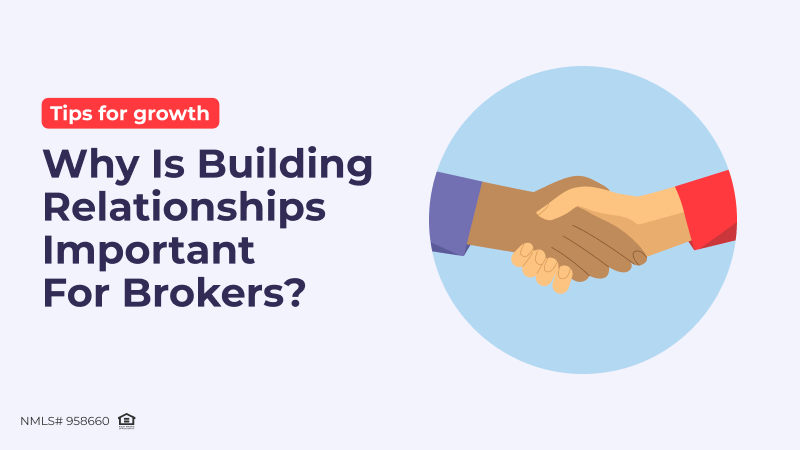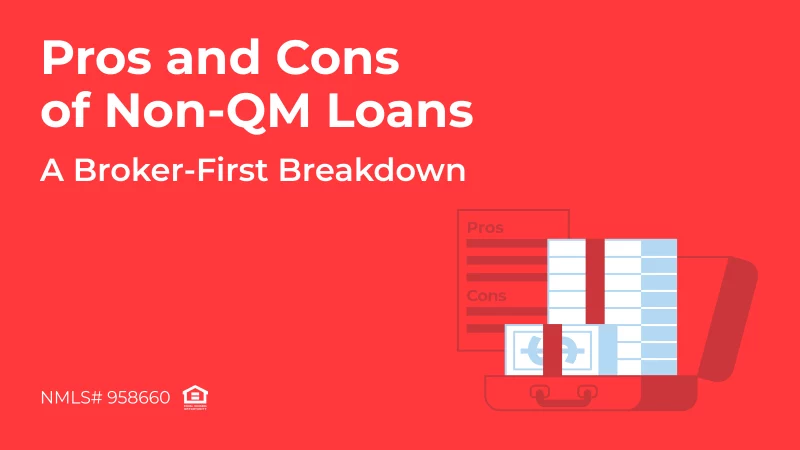
In the mortgage industry, trust and reputation play a crucial role. Establishing robust relationships can greatly influence a broker’s success. These connections go beyond transactions, nurturing lasting client loyalty, valuable industry ties, and strategic local partnerships. This article educates mortgage brokers on the significance of relationship building. Learn why building relationships is important for brokers, see practical strategies and real-life examples.
Understanding Business Relationships
Business relationships are vital for a mortgage broker‘s success. They encompass connections with clients, industry professionals, and local businesses, providing support, referrals, and collaboration opportunities.
Types of Business Relationships
- Client Relationships. These bonds are built on trust, effective communication, and understanding client needs and goals. Strong client relationships foster loyalty and referrals.
- Industry Partnerships. Collaborations with real estate agents, mortgage lenders, and financial advisors offer mutual referrals and insights, keeping brokers informed about industry trends.
- Local Business Connections. Partnering with local businesses enhances community presence, creating opportunities for cross-promotions and community involvement.
Nurturing these relationships is key for brokers to excel. Strong connections with clients, industry peers, and local businesses enhance success and reputation.
Importance of Building Client Relationships
Choose a top nationwide lender that cares about your growth!
Get StartedClient relationships are the cornerstone of a mortgage broker’s business. Satisfied clients are more likely to return for future services and refer others, making these relationships pivotal for sustained success.
Benefits of Strong Client Relationships
- Trust and Loyalty. Clients who trust their broker are more likely to remain loyal and seek their services for future needs. Trust is built through consistent, transparent, and honest communication, ensuring clients feel secure and confident in their broker’s expertise.
- Referrals. Satisfied clients often refer friends and family to their broker, expanding the broker’s client base. Personal recommendations are powerful endorsements that can significantly boost a broker’s reputation and business growth.
- Personalized Service. Understanding clients’ unique needs allows brokers to provide tailored solutions, enhancing client satisfaction. Personalized service demonstrates a broker’s commitment to addressing specific client concerns and goals, leading to higher satisfaction and loyalty.
Tips for Building and Maintaining Client Relationships
- Personalized Communication. Tailor your communication to address individual client needs and preferences. Use their preferred communication channels, whether it’s email, phone calls, or face-to-face meetings. Personalized communication shows clients that you value them as individuals and are dedicated to meeting their unique needs.
- Regular Follow-Ups. Keep in touch with clients even after the transaction is complete. Regular follow-ups show that you value the relationship beyond the initial deal. This ongoing engagement helps maintain a strong connection and keeps you top of mind for future needs or referrals.
- Knowing Your Client’s Needs. Take the time to understand the specific goals and concerns of each client. This enables you to provide more relevant advice and solutions, ensuring that your services align with their expectations and objectives. By actively listening and responding to client needs, you can build a deeper, more trusting relationship.
Strong client relationships are essential for mortgage brokers. By fostering trust, encouraging referrals, and providing personalized service, brokers can ensure long-term success and client satisfaction. Prioritizing these relationships leads to a robust network of loyal clients and a steady stream of new business opportunities.
Building Relationships with Industry Professionals
Building relationships with industry professionals is crucial for mortgage brokers. These connections can provide valuable referrals, insights, and opportunities for collaboration.
Significance of Networking
- Referrals. Establishing strong connections with real estate agents, other brokers, lenders, and financial advisors can lead to a steady stream of client referrals. These professionals often encounter individuals in need of mortgage services and can recommend your expertise.
- Knowledge Sharing. Networking with industry peers allows brokers to exchange insights, stay updated on industry trends, and learn best practices. This shared knowledge can improve your service offerings and help you stay competitive.
- Collaborative Opportunities. Industry relationships can lead to joint ventures and partnerships. For instance, co-hosting seminars or workshops with real estate agents or financial advisors can attract a broader audience and enhance your professional credibility.
Strategies for Effective Networking
- Attend Industry Events. Participate in conferences, seminars, and workshops to meet and connect with other professionals. These events provide a platform to learn, share ideas, and establish meaningful relationships.
- Leverage Social Media. Use platforms like LinkedIn to connect with peers, join industry groups, and stay informed about industry trends. Engaging with content, sharing insights, and participating in discussions can increase your visibility and establish you as a thought leader.
- Join Professional Associations. Being part of associations such as the Mortgage Bankers Association (MBA) or the National Association of Mortgage Brokers (NAMB) offers networking opportunities and access to valuable resources. Membership in these associations can enhance your credibility and provide a platform for professional development.
- Host Networking Events. Consider hosting your events, such as webinars or meet-and-greets, to connect with industry professionals. This proactive approach can position you as a leader in the field and foster strong, lasting relationships.
Building relationships with industry professionals is vital for mortgage brokers. By networking effectively, brokers can gain referrals, share knowledge, and explore collaborative opportunities, all contributing to their professional success and client satisfaction. Prioritize these connections to enhance your business growth and industry standing.
Connecting with Local Businesses
Forming relationships with local businesses is a strategic way for mortgage brokers to enhance their community presence, generate referrals, and create mutually beneficial opportunities. These connections can significantly contribute to a broker’s success and reputation.
Advantages of Local Business Connections
- Cross-Promotions. Collaborating with local businesses for joint promotions can expand your reach to their customer base. For example, partnering with a local home improvement store can attract homeowners interested in mortgage refinancing.
- Community Involvement. Active participation in community events and activities helps build a positive reputation. Being seen as a committed and engaged community member can attract clients who value local expertise and support.
- Mutual Referrals. Establishing a referral network with local businesses creates a win-win situation. Local businesses can refer clients to you for mortgage services, and you can refer your clients to them for related needs, such as real estate services or home repairs.
4 Ways to Build Local Business Relationships
- Cross-Promotions. Partner with local businesses for joint marketing campaigns. Offer discounts or special deals to each other’s customers. For example, you could collaborate with a local realtor to offer a discount on closing costs for clients who use both your services.
- Community Involvement. Participate in or sponsor local events, such as charity runs, festivals, or school activities. This increases your visibility and shows your commitment to the community. Volunteering or supporting local causes can also create goodwill and strengthen your community ties.
- Mutual Referrals. Develop a network of local businesses where you can exchange referrals. Establishing a trusted network ensures that clients receive comprehensive service recommendations, which can enhance their overall experience. Regularly meet with local business owners to discuss how you can support each other’s businesses.
- Local Business Networking Events. Attend or host networking events for local businesses. These events provide an opportunity to meet and establish relationships with business owners in your community. Building these connections can lead to collaborative opportunities and referrals.
Mortgage brokers should build relationships with local businesses. This will help them become more visible in the community. It will also attract more clients to their services. Brokers can grow their success by working together with others, joining community events, and sharing referrals. This helps them build a strong network.
Technology in Relationship Building
Technology plays a pivotal role in building and maintaining relationships for mortgage brokers. It enhances efficiency, facilitates communication, and helps brokers stay connected with clients and industry professionals.
Facilitating Relationship-Building
- CRM Tools. Customer Relationship Management (CRM) tools like Salesforce or HubSpot help organize and manage client interactions. They ensure timely follow-ups and personalized communication by tracking client preferences and history. This leads to more effective and targeted relationship-building efforts.
- Social Media Platforms. Platforms like LinkedIn, Facebook, and X (formerly Twitter) provide avenues for networking and engaging with clients and industry professionals. Regularly posting updates, sharing industry insights, and participating in discussions can increase visibility and establish a broker as a knowledgeable and approachable expert.
- Email Marketing. Email marketing services like Mailchimp or Constant Contact allow brokers to send personalized and informative content to clients. Newsletters, market updates, and personalized messages keep clients engaged and informed, fostering a sense of connection and trust.
Leveraging technology can significantly enhance a broker’s relationship-building efforts. Brokers can use CRM tools, social media, and email marketing to stay connected with clients and industry professionals. This can help them achieve success and keep their clients satisfied.
Challenges and How to Overcome Them

Struggling with
a loan scenario?
Get a solution in 30 minutes! Fill out
the short form and get your personal offer
Building and maintaining strong relationships in the mortgage industry comes with its challenges. However, with the right strategies, these obstacles can be effectively managed.
Common Challenges
- Time Constraints. Brokers often juggle multiple responsibilities, leaving limited time for relationship-building activities. Balancing client interactions, administrative tasks, and networking can be overwhelming.
- Communication Barriers. Miscommunications or delayed responses can hinder relationship development. Ensuring clear, consistent, and timely communication is crucial but can be challenging in a busy schedule.
- Maintaining Consistency. Regularly staying in touch with clients and partners requires consistent effort and organization. It’s easy for these interactions to fall through the cracks amid pressing tasks.
Practical Solutions
- Time Management Tips. Prioritize relationship-building by scheduling dedicated time for networking, follow-ups, and client meetings. Using tools like calendars and task management apps can help allocate time efficiently and ensure these activities are not overlooked.
- Effective Communication Techniques. Clear and concise communication is key. Use active listening and respond promptly to client inquiries. Utilizing CRM tools can help keep track of conversations and ensure timely follow-ups.
- Leveraging Technology. Utilize technology to automate and streamline communication. CRM systems can manage client data and automate follow-up reminders, ensuring consistent engagement. Email marketing tools can schedule regular updates to keep clients informed.
- Delegation. Consider delegating administrative tasks to assistants or using virtual assistants to free up more time for relationship-building activities.
Building relationships can be hard because of a lack of time, communication problems, and the need for consistency. But using good time management, clear communication, and technology can help overcome these challenges. By addressing these challenges proactively, brokers can maintain strong, lasting relationships that drive their success.
Conclusion
Building strong business relationships is essential for mortgage brokers seeking to enhance their professional success and client satisfaction. Building strong client relationships, networking, and connecting with local businesses have significant benefits that reach far and wide.
Mortgage brokers should make relationship-building a core part of their professional practice. Developing strong relationships with clients can result in increased referrals, loyalty, and a positive reputation in the mortgage industry. This can ultimately lead to long-term success. Prioritizing these relationships is not just beneficial; it is essential for long-term growth and success.


